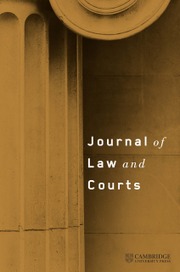No CrossRef data available.
Article contents
Second-Order Evaluations of the European Court of Human Rights
Published online by Cambridge University Press: 21 October 2022
Abstract
Scholars have found that citizens tend to evaluate European institutions in light of how they feel about their own domestic institutions (second-order evaluations). We argue that this approach is more appropriate for understanding international courts than is the legitimacy approach of the law and courts literature. While studies applying the second-order evaluations approach have overwhelmingly focused on EU institutions, here we seek to determine whether second-order evaluations are also characteristic of citizens’ opinions about the European Court of Human Rights. We evaluate our hypotheses using a sample of the British population and find strong support for the general second-order evaluation.
- Type
- Research Article
- Information
- Copyright
- © 2015 by Law and Courts Organized Section of the American Political Science Association. All rights reserved.
Footnotes
We would like to thank the anonymous referees and David Klein for their help in improving our work. A previous version of this manuscript was presented at the Southern Political Science Association Conference, where we also received valuable feedback. Finally, we would like to thank Harold Clarke, who generously made room on the British Election Study available to us.


